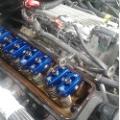Just trying to compile the latest source on linux, got some small errors compiling.
first,
Code:
g++ -o autospark.o autospark.cpp
In file included from safetypes.h:6:0,
from datalog.h:5,
from autospark.h:5,
from autospark.cpp:1:
config.h:29:0: warning: ignoring #pragma warning [-Wunknown-pragmas]
#pragma warning(disable: 4100)
^
In file included from datalog.h:5:0,
from autospark.h:5,
from autospark.cpp:1:
safetypes.h:21:3: error: ‘QMutex’ does not name a type
QMutex m;
^
safetypes.h:32:3: error: ‘QMutex’ does not name a type
QMutex m;
^
safetypes.h:43:3: error: ‘QMutex’ does not name a type
QMutex m;
^
safetypes.h:55:3: error: ‘QMutex’ does not name a type
QMutex m;
^
Makefile:7188: recipe for target 'autospark.o' failed
make: *** [autospark.o] Error 1
I added an include for qmutex.h in autospark.h and got past that error.
Now getting this:
Code:
linux-g++ -o flash_routine.o flash_routine.cpp
In file included from flash_routine.cpp:2:0:
config.h:29:0: warning: ignoring #pragma warning [-Wunknown-pragmas]
#pragma warning(disable: 4100)
^
flash_routine.cpp: In member function ‘void datastream::read_flash_procedure()’:
flash_routine.cpp:591:3: error: jump to label ‘FLASH_READ_CLEANUP’ [-fpermissive]
FLASH_READ_CLEANUP:
^
flash_routine.cpp:534:10: note: from here
goto FLASH_READ_CLEANUP;
^
flash_routine.cpp:541:8: note: crosses initialization of ‘bool ram_notify’
bool ram_notify = false;
^
flash_routine.cpp:591:3: error: jump to label ‘FLASH_READ_CLEANUP’ [-fpermissive]
FLASH_READ_CLEANUP:
^
flash_routine.cpp:529:10: note: from here
goto FLASH_READ_CLEANUP;
^
flash_routine.cpp:541:8: note: crosses initialization of ‘bool ram_notify’
bool ram_notify = false;
^
flash_routine.cpp:591:3: error: jump to label ‘FLASH_READ_CLEANUP’ [-fpermissive]
FLASH_READ_CLEANUP:
^
flash_routine.cpp:520:46: note: from here
if(control->flash_exit.get() == true) goto FLASH_READ_CLEANUP;
^
flash_routine.cpp:541:8: note: crosses initialization of ‘bool ram_notify’
bool ram_notify = false;
^
flash_routine.cpp:591:3: error: jump to label ‘FLASH_READ_CLEANUP’ [-fpermissive]
FLASH_READ_CLEANUP:
^
flash_routine.cpp:518:10: note: from here
goto FLASH_READ_CLEANUP; // failure here means no chance of reset
^
flash_routine.cpp:541:8: note: crosses initialization of ‘bool ram_notify’
bool ram_notify = false;
^
flash_routine.cpp:591:3: error: jump to label ‘FLASH_READ_CLEANUP’ [-fpermissive]
FLASH_READ_CLEANUP:
^
flash_routine.cpp:514:46: note: from here
if(control->flash_exit.get() == true) goto FLASH_READ_CLEANUP;
^
flash_routine.cpp:541:8: note: crosses initialization of ‘bool ram_notify’
bool ram_notify = false;
^
flash_routine.cpp:591:3: error: jump to label ‘FLASH_READ_CLEANUP’ [-fpermissive]
FLASH_READ_CLEANUP:
^
flash_routine.cpp:512:10: note: from here
goto FLASH_READ_CLEANUP; // must reset since t-side already loaded
^
flash_routine.cpp:541:8: note: crosses initialization of ‘bool ram_notify’
bool ram_notify = false;
^
flash_routine.cpp:591:3: error: jump to label ‘FLASH_READ_CLEANUP’ [-fpermissive]
FLASH_READ_CLEANUP:
^
flash_routine.cpp:504:46: note: from here
if(control->flash_exit.get() == true) goto FLASH_READ_CLEANUP;
^
flash_routine.cpp:541:8: note: crosses initialization of ‘bool ram_notify’
bool ram_notify = false;
^
flash_routine.cpp:591:3: error: jump to label ‘FLASH_READ_CLEANUP’ [-fpermissive]
FLASH_READ_CLEANUP:
^
flash_routine.cpp:502:10: note: from here
goto FLASH_READ_CLEANUP; // failure here means no chance of reset
^
flash_routine.cpp:541:8: note: crosses initialization of ‘bool ram_notify’
bool ram_notify = false;
^
flash_routine.cpp:591:3: error: jump to label ‘FLASH_READ_CLEANUP’ [-fpermissive]
FLASH_READ_CLEANUP:
^
flash_routine.cpp:496:46: note: from here
if(control->flash_exit.get() == true) goto FLASH_READ_CLEANUP;
^
flash_routine.cpp:541:8: note: crosses initialization of ‘bool ram_notify’
bool ram_notify = false;
^
flash_routine.cpp:609:3: error: jump to label ‘FLASH_READ_CLEANUP_NO_RST’ [-fpermissive]
FLASH_READ_CLEANUP_NO_RST:
^
flash_routine.cpp:494:10: note: from here
goto FLASH_READ_CLEANUP_NO_RST;
^
flash_routine.cpp:541:8: note: crosses initialization of ‘bool ram_notify’
bool ram_notify = false;
^
flash_routine.cpp:609:3: error: jump to label ‘FLASH_READ_CLEANUP_NO_RST’ [-fpermissive]
FLASH_READ_CLEANUP_NO_RST:
^
flash_routine.cpp:486:12: note: from here
goto FLASH_READ_CLEANUP_NO_RST;
^
flash_routine.cpp:541:8: note: crosses initialization of ‘bool ram_notify’
bool ram_notify = false;
^
Makefile:9304: recipe for target 'flash_routine.o' failed
make: *** [flash_routine.o] Error 1
Can probably get it to compile with -fpermissive, but thought I'd let you know what I'm seeing. This is compiling with 5.6




 Reply With Quote
Reply With Quote


Bookmarks